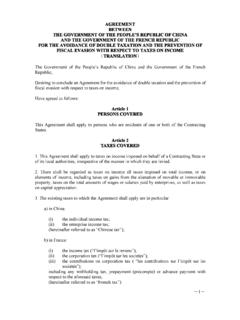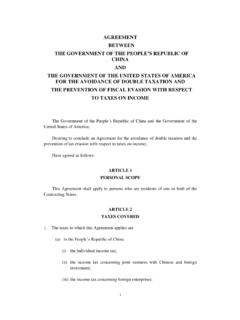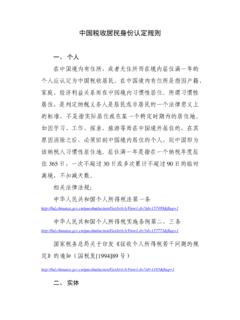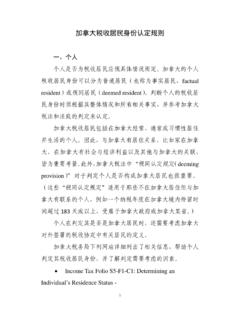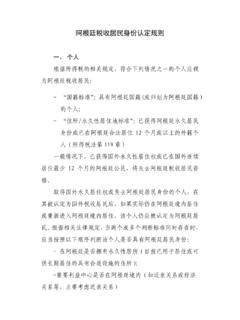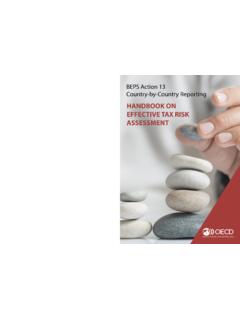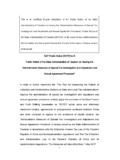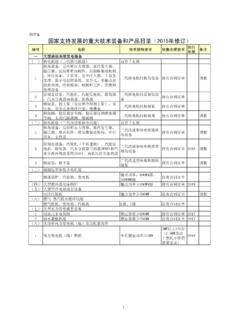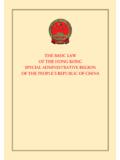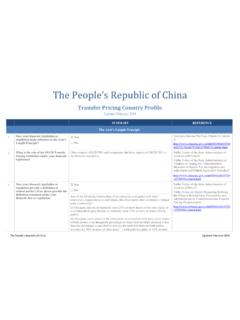Transcription of AGREEMENT BETWEEN THE GOVERNMENT OF …
1 1 AGREEMENT BETWEEN THE GOVERNMENT OF THE people S republic OF CHINA AND THE GOVERNMENT OF JAPAN FOR THE AVOIDANCE OF DOUBLE TAXATION AND THE PREVENTION OF FISCAL EVASION WITH RESPECT TO TAXES ON INCOME The GOVERNMENT of the people s republic of China and the GOVERNMENT of Japan; Desiring to conclude an AGREEMENT for the avoidance of double taxation and the prevention of fiscal evasion with respect to taxes on income; Have agreed as follows: ARTICLE 1 PERSONAL SCOPE This AGREEMENT shall apply to persons who are residents of one or both of the Contracting States.
2 ARTICLE 2 TAXES COVERED 1. The taxes to which this AGREEMENT shall apply are: (a) in the people s republic of China: (i) the individual income tax; (ii) the income tax concerning joint ventures using Chinese and foreign investment; (iii) the income tax concerning foreign enterprises; and 2(iv) the local income tax (hereinafter referred to as Chinese tax ) ; (b) in Japan: (i) the income tax; (ii) the corporation tax; and (iii) the local inhabitant taxes (hereinafter referred to as Japanese tax ) . 2. This AGREEMENT shall also apply to any identical or substantially similar taxes which are imposed after the date of signature of this AGREEMENT in addition to, or in place of, those referred to in paragraph 1.
3 The competent authorities of the Contracting States shall notify each other of any substantial changes which have been made in their respective taxation laws within a reasonable period of time after such changes. ARTICLE 3 GENERAL DEFINITIONS 1. For the purposes of this AGREEMENT , unless the context otherwise requires: (a) the term the people s republic of China , when used in a geographical sense, means all the territory of the people s republic of China, including its territorial sea, in which the laws relating to Chinese tax are in force, and all the area beyond its territorial sea, including the seabed and sub-soil thereof, over which the people s republic of China has jurisdiction in accordance with international law and in which the laws relating to Chinese tax are in force.
4 (b) the term Japan , when used in a geographical sense, means all the territory of Japan, including its territorial sea, in which the laws relating to Japanese tax are in force, and all the area beyond its territorial sea, including the seabed and subsoil thereof, over which Japan has jurisdiction in accordance with international law and in which the laws relating to Japanese tax are in force; (c) the terms a Contracting State and the other Contracting State mean the people s republic of China or Japan, as the context requires; (d) the term tax means Chinese tax or Japanese tax, as the context requires; 3(e) the term person includes an individual, a company and any other body of persons; (f) the term company means any body corporate or any entity which is treated as a body corporate for tax purposes; (g) the terms enterprise of a Contracting State and enterprise of the other Contracting State mean, respectively, an enterprise carried on by a resident of a Contracting State and an enterprise carried on by a resident of the other Contracting State.
5 (h) the term nationals means all individuals possessing the nationality of either Contracting State and all juridical persons created or organized under the laws of that Contracting State and all organizations without juridical personality treated for the purposes of tax of that Contracting State as juridical persons created or organized under the laws of that Contracting State; (i) the term international traffic means any transport by a ship or aircraft operated by an enterprise of a Contracting State, except when the ship or aircraft is operated solely BETWEEN places in the other Contracting State; (j) the term competent authority means, in the case of the people s republic of China, the Ministry of Finance or its authorized representative and, in the case of Japan, the Minister of Finance or his authorized representative.
6 2. As regards the application of this AGREEMENT by a Contracting State, any term not defined in this AGREEMENT shall, unless the context otherwise requires, have the meaning which it has under the laws of that Contracting State concerning the taxes to which this AGREEMENT applies. ARTICLE 4 RESIDENT 1. For the purposes of this AGREEMENT , the term resident of a Contracting State means any person who, under the laws of that Contracting State, is liable to tax therein by reason of his domicile, residence, place of head or main office or any other criterion of a similar nature.
7 2. Where by reason of the provisions of paragraph 1 an individual is a resident of both Contracting States, then the competent authorities of the Contracting States shall determine by mutual AGREEMENT the Contracting State of which that individual shall be deemed to be a resident for the purposes of this AGREEMENT . 43. Where by reason of the provisions of paragraph 1 a person other than an individual is a resident of both Contracting States, then it shall be deemed to be a resident of the Contracting State in which its head or main office is situated.
8 ARTICLE 5 PERMANENT ESTABLISHMENT 1. For the purposes of this AGREEMENT , the term permanent establishment means a fixed place of business through which the business of an enterprise is wholly or partly carried on. 2. The term permanent establishment includes especially: (a) a place of management; (b) a branch; (c) an office; (d) a factory; (e) a workshop; and (f) a mine, an oil or gas well, a quarry or any other place of extraction of natural resources. 3. A building site, a construction, assembly or installation project or supervisory activities in connection therewith, constitute a permanent establishment only if such site, project or activities continue for a period of more than six months.
9 4. Notwithstanding the provisions of paragraphs 1 to 3, the term permanent establishment shall be deemed not to include: (a) the use of facilities solely for the purpose of storage, display or delivery of goods or merchandise belonging to the enterprise; (b) the maintenance of a stock of goods or merchandise belonging to the enterprise solely for the purpose of storage, display or delivery; (c) the maintenance of a stock of goods or merchandise belonging to the enterprise solely for the purpose of processing by another enterprise; 5(d) the maintenance of a fixed place of business solely for the purpose of purchasing goods or merchandise, or of collecting information, for the enterprise; (e) the maintenance of a fixed place of business solely for the purpose of carrying on, for the enterprise, any other activity of a preparatory or auxiliary character.
10 5. An enterprise of a Contracting State shall be deemed to have a permanent establishment in the other Contracting State if it furnishes in that other Contracting State consultancy services through employees or other personnel other than an agent of an independent status to whom the provisions of paragraph 7 apply provided that such activities continue (for the same project or two or more connected projects) for a period or periods aggregating more than six months within any twelve-month period. 6. Notwithstanding the provisions of paragraphs 1 and 2, where a person other than an agent of an independent status to whom the provisions of paragraph 7 apply is acting in a Contracting State on behalf of an enterprise of the other Contracting State, that enterprise shall be deemed to have a permanent establishment in the first-mentioned Contracting State in respect of any activities which that person undertakes for the enterprise, if.
